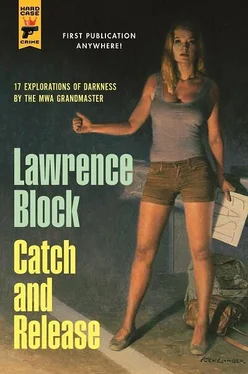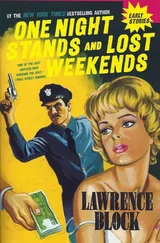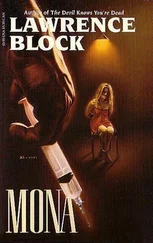Lawrence Block
Catch and Release
A Burglar’s Eye View of Greed
So I walked over to Barnegat Books on East Eleventh Street for a word with my favorite bookseller, Bernie Rhodenbarr. He was behind the counter with his nose in a book while his cat lay in the window, soaking up the sun. The store’s sole customer was a young woman with multiple piercings who was reading a biography of St. Sebastian.
“I understand the used-book business is hot these days,” I said. “You must be making money hand over fist.”
He gave me a look. “Every now and then,” he said, “somebody actually buys a book. It’s a good thing I don’t have to depend on this place to keep body and soul together.”
He doesn’t have to pay rent, either, having bought the building with the profits from his other career as the last of the gentleman burglars. Seriously, I told him, lots of people were making big bucks selling books on the Internet. Couldn’t he do the same?
“I could,” he agreed. “I could list my entire stock on eBay and spend my time wrapping books and shlepping them to the Post Office. I could close the store, because who needs a retail outlet when you’ve got a computer and a modem? But I didn’t open this store to get rich. I opened it so I could have a bookstore, and have fun running it, and occasionally meet girls. See, I’m not greedy.”
“But you steal,” I pointed out.
He frowned, and nodded toward St. Sebastian’s biggest fan. “Not to get rich,” he said. “Only enough to get by. I don’t want to get rich, see, because it would turn me into a greedy pig.”
“You’re saying the rich are greedy?”
“They don’t necessarily start out that way,” he said, “but that’s how it seems to work. Look at all the CEOs with their eight-figure salaries. The more you pay them, the more they want, and when the company goes down the tubes they float down on their golden parachutes and look for another corporation to sink. Or look at baseball.”
“Baseball?”
“America’s pastime,” he said. “The players used to have off-season jobs so they could make ends meet. The owners were always rich guys, but they were in it for the sport. They didn’t expect to make money.”
“And?”
“And now the players average something like two million dollars a year, and the owners have watched their investments increase in value by a factor of five or ten, and everybody’s rich, so everybody’s greedy. And that’s why we’re going to have a strike this fall. Because they’re all pigs, and all they want is more.”
“In other words,” I said, “success turns men to swine.”
“And women,” he said. “Success is an equal-opportunity corrupter. And it seems to be inevitable nowadays. Nobody’s happy just running a business and making a living. Everybody wants to grow the business, and either franchise it or sell it to a huge corporation. Luckily, I’m safe. Nobody’s aching to franchise Barnegat Books, and no multinational corporation’s trying to buy me out.”
“So you’ll go on selling books.”
“Every now and then,” he said, as the young woman put St. Sebastian back on the shelf and walked away empty-handed. “I’ll tell you, it’s a good thing I’m a thief. It keeps me honest.”
A little after midnight, Gordon Benning, a balding gastroenterologist with a perpetually dyspeptic expression on his long face, announced as he dealt the cards that his next deal would be his final hand. Several players indicated their agreement, and one, a CPA with a propensity for stating the obvious, said, “So this is the last round.”
And so it was. Richard Krale (Dick to his friends, Richard to his wife, who reserved the diminutive for a specific portion of her husband) would have preferred it otherwise. He wished the game could go on for another three hours, so that he might recoup his losses, or that it had ended three hours earlier, when he’d been briefly ahead. Now he had, what? Six, seven hands to get even?
The game was dealer’s choice, and ninety percent of the time the choice was seven-card stud. The dealer anted a buck for the table, the limit was five dollars, ten dollars on the last card. (The same betting rules applied in five-card stud. In draw poker, the bet was five dollars before the draw, ten dollars after.)
Krale was the host, as well as being the evening’s big loser. In the latter capacity more than the former, he suggested doubling the betting limits for the final round. That was all right with Mark Taggert, who had a mountain of chips in front of him, but the other players shook their heads dismissively, and that was that. It was by no means unusual for someone, generally the biggest loser, to make this suggestion; it was always voted down.
And that was just as well for Krale, as it turned out, because his luck was no better in the last round than it had been for the preceding three hours. It was worse, if anything, because desperation led him to play hands he’d have been well advised to fold at their onset, and to stay to the end in hands where he should have cut his losses. When Benning dealt the last hand of the evening, Krale chased flush and straight possibilities, backed into two pair, queens over fives, tried to buy the pot with a raise, and lost to Taggert’s three sixes.
“Hey, the night’s a pup,” he said. “No reason to quit now.”
No one even bothered to respond. They were all counting their chips and figuring out what they had coming, and in turn they announced their totals and waited for Krale to pay them. He’d set aside the cash they’d all bought in with, and when that was gone he still had two players to pay off — Norm McLeod, who had $120 coming, and Taggert, who’d had a very good last round.
He dug out his wallet, counted out five twenties and a pair of tens, and paid McLeod, who looked almost apologetic as he pocketed the money. Taggert, who looked not at all apologetic, announced that the chips in front of him came to $538.
“Stick around,” Krale said. “I’ll have to write you a check.”
The others left, and Krale shook their hands and wished them well. Then he took his time finding his checkbook.
“Some run of cards,” he said.
“You caught a lot of second-best hands,” Taggert said. “Nothing much you can do when that happens but wait for the cards to turn.”
“They never did.”
“There’s always next week.”
“I hate to wait that long,” Krale said. He’d uncapped the pen but had not as yet touched it to the check. “You in a rush to get home?”
“You want to play some more?”
“I wouldn’t mind.”
“Heads up, you mean? Just the two of us?”
Krale made a show of looking to his left and right, then at Taggert. “I don’t see anybody else here,” he said, “so I guess we’re stuck with each other.”
Taggert thought about it. “I’ll just keep these chips, then.”
“Right. And I’ll help myself from the bank.” He did so, stacking the chips in front of him, giving himself a bigger bankroll than Taggert’s. That would help psychologically, he told himself. The player with fewer chips was at a disadvantage, doomed to play with a loser’s mentality. This way he could feel like a winner, and it was only a matter of time before he’d be one.
Taggert didn’t seem awed by Krale’s chips. He rearranged his own stacks, and for some reason the new arrangement made it look to Krale as though there were more of them.
“Same rules?”
Krale nodded. “Except we can forget about the three-raise limit,” he said. “Since there’s just the two of us.”
“Makes sense.”
“How about a drink before we get started?”
Читать дальше








